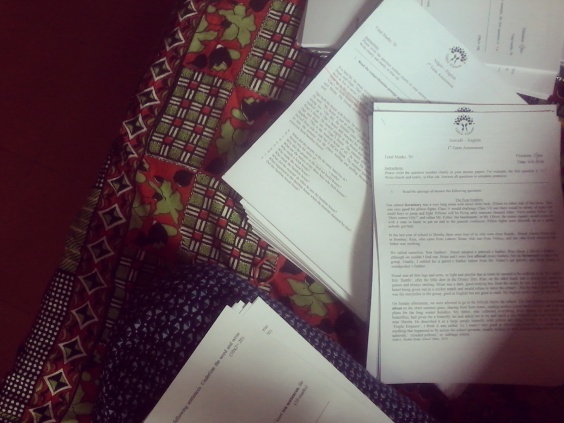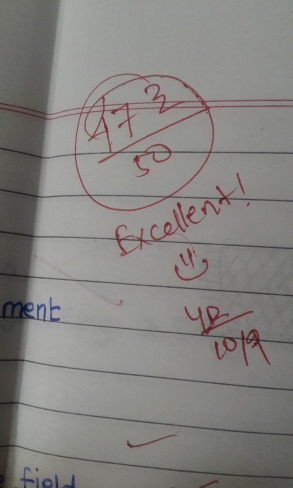My bed was a mess this morning, littered with a stapler, stapler pins, pens in three different colours, a pencil, and of course, sheafs of paper. There they lay, all bundled up, waiting for me to check whether every copy had all the pages, whether they were stapled right, whether the print was clear on all of them. Class 6, Class 7, Class 8 Written, Class 8 Listening, Class 9 and 10 board exam practice papers; all of them. And as I reminded myself not to skimp on the time I was spending checking, and not to fall prey to the “if one is right, they all must be” assumption, I remembered all the cursing I have done as a student – about teachers who did not give portions early enough, of those who gave them and then changed their minds, of question papers that seemed foreign, of question papers too long and occasionally, too short. And suddenly I realise how easy it is to be all those things. Yikes.

Over the last few days, just as I thought I was getting used to this whole teacher identity, I was struck by a new wave of incredulity. I pinged my brother furiously last evening, saying, “I cannot believe what I just wrote. ‘X is an enthusiastic child with an ear for phonetics. With some more attention and concentrated effort, his writing will reflect his imagination.’ What is happening??” Needless to say, he had a riot, calling me old multiple times over, but the thing is this. As I sat down to write out the reports of a bunch of students that I had known for barely three months, I could hear the voices of all my own teachers in my head as my own string of report cards danced away in front of me.
When I first joined school in India, reports were a rather stoic affair – a blue piece of cardboard folded in half, with a tabulated page for individual subject marks. Term I, Term II, Term III for English, Math, Science, Social, Hindi, Sanskrit, and MI/GK (LOL). The last few rows will tell you how many days you took off and then the class teacher would scrawl her initials into a tiny box to put her stamp of authority on it. On the right side, there were three boxes, one for each term, for the class teacher to fill in her comments. If she liked you, you would get ‘Excellent,’ if she knew you, it would probably read ‘Good,’ and everyone else dealt with ‘Needs Improvement’. That was the end of that affair. Finito.
Through middle school, report cards got a little more complicated, more because of a change in school than age, to be fair. We had little yellow booklets (and then later I think the covers became pink) which a page per term, and grades as well as marks per subject. Our class teachers wrote out a paragraph for each of us, which I guess she could because we were half a dozen kids in total. ‘She is hard working but prone to careless mistakes,’ it might say. Or ‘she has a tendency to distract the class after finishing her own work.’ In this pink/yellow report card, she had a little more space to sign her own name, leave her mark.
And then, higher secondary school. Another school, another system, and more elaborate report cards. Well, to be honest, I don’t think they were called report cards at all. Personalised Learning Plans (PLPs), if my memory serves me right. Before we wrote an exam, we would be asked to set a target for ourselves and after the paper got corrected, our reports would have bar graphs for every subject – expected, actual, expected, actual. I vaguely feel like there was a third bar as well, though I can’t remember what it was. Each subject was also judged on a number of parameters, again can’t remember what, but I remember fancy colour print outs with different colour for each parameter being dutifully lugged home every term.
It was all of this, memories coloured blue, pink, yellow, purple and green, that flashed before me as I drowned in mountains of paper. In the years since I left school, it seems report cards have changed. Today, I fill out what is called a ‘Progress Report Book’. Yes, you read that right. Book. And I get a page to myself. English Listening/Speaking, English Reading, English Writing – everything is assessed, further broken down into tiny components. From ‘listens attentively to ‘evaluates information for bias,’ everything gets a grade. After filling letters in twenty-six different boxes for every kid, I then get another box all to myself, ‘Teacher’s Comments’. And am faced with the task of figuring out something new to say, different from the meticulously spelt out parameters judging English learning that spanned out above my weary hand.
Bringing us back to X and his vivid imagination. Coming from a system myself where outright negative comments were not appreciated by the school management, I got the thought process. I also agreed with it. Kids could use the prep of hearing nice things about themselves after three months of putting up with us, and if that saves them some trouble with the ‘rents, then why ever not. Perfect. Except talk to me at the end of forty-odd reports, with almost as many left to go, and I will tell you this. There are only that many ways you can talk about being distracted and careless, without using the words ‘distracted’ and ‘careless.’ (Yuck, I see my brother’s point.) It was in these circumstances that I found myself writing about vivid imaginations that were just not adequately reflected, and a ‘willingness to learn that would benefit from more concentrated engagement in the classroom.’ Thank God for a degree in the liberal arts.
As I closed my black pen and brushed off eraser dust from my dry runs, I couldn’t help but be caught off guard by the evolution of report cards in my own life. Blue pieces of cardboard stamped with ‘enrolment number 9997’ to an exhaustive/exhausting string of twenty-six letters, BBCCBADBCDAB and so on, for each subject. From ‘good’ to ‘active, willing participant with an intuitive grasp of the language’.
This job never ceases to surprise me.

